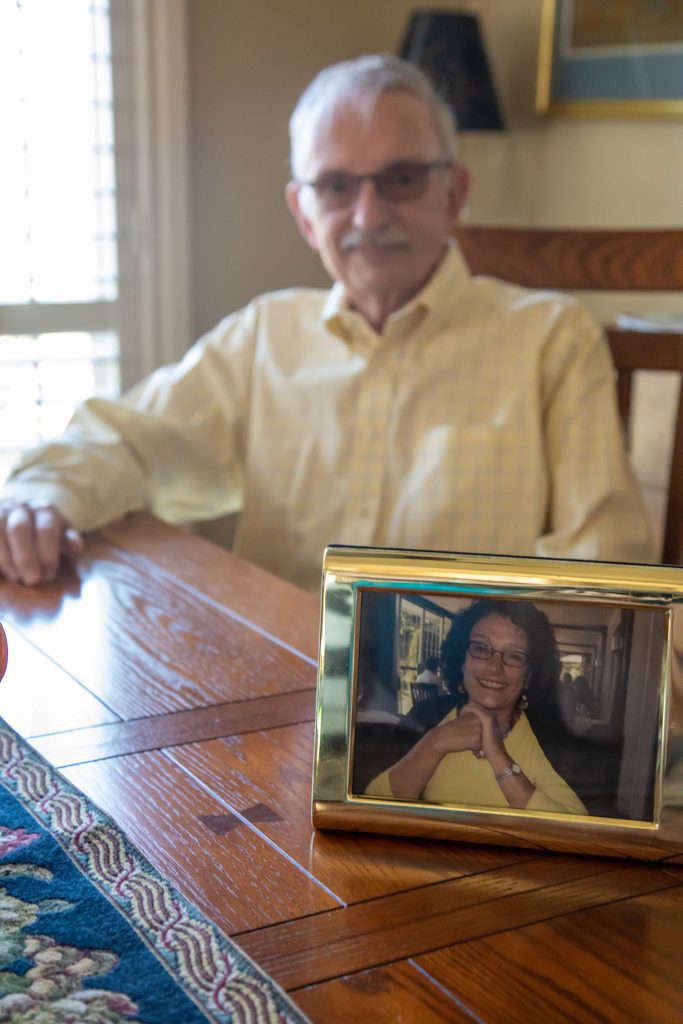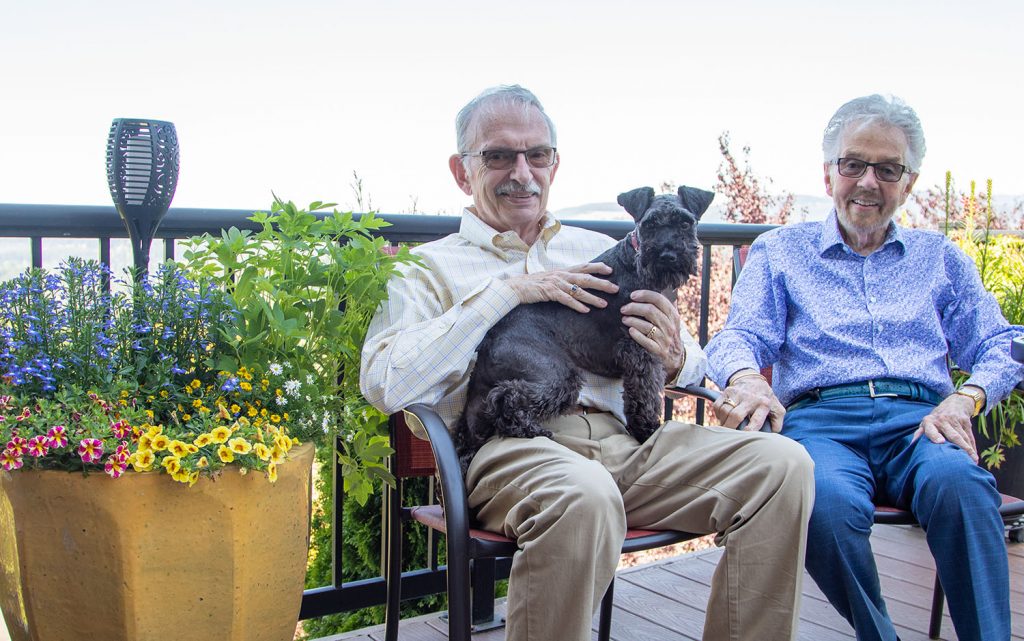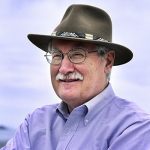Teachers + Clark = a better education
5 minute read
Educators passionate about supporting Clark

Ed Bedecarrax funds a scholarship in memory of his sister, Jean Marie Bedecarrax, foreground. She tackled discrimination in the workplace in the 1980s as a female executive at a construction company. The scholarship is intended to empower woman to be leaders. Photo by Jenny Shadley
For 36 years, Ed Bedecarrax worked at City College of San Francisco, teaching anatomy and physiology and environmental sciences and then serving as a dean of instruction before retiring to Camas, Wash. with his husband, Hal Kauffman. About 48 hours after they moved into their new home, Bedecarrax received a phone call from Clark College. The caller, a friend of one of Bedecarrax’s colleagues in San Francisco, wanted him to teach a physiology course at Clark.
“I was officially retired for about three days,” Bedecarrax said.
After teaching physiology at Clark, Bedecarrax moved on to Clark’s Mature Learning program—today known as Community and Continuing Education. He was able to diversify his interests, such as explore Italian art history, while still doing what he loved: teaching. For the past year and a half, Bedecarrax has taught quarterly courses on the history of Italy and Italian artists and the role of women in Italian Renaissance painting.
“Many great Italian artists were women, but you don’t know anything about them,” he said, “because they painted under the name of their father or husband.”
Memorializing his sister
The topic not only captivated Bedecarrax but connected him to his late sister, Jean Marie Bedecarrax, whom he felt was misunderstood and underappreciated during her life. This experience is one example of what Bedecarrax said he continues to gain from a lifetime of teaching.
Now, Bedecarrax is funding a $2,750 annual scholarship to memorialize his sister and give back after a rewarding career. He joins the many educators and former educators who give to Clark College Foundation in support of Clark College students with a generosity that far surpasses the modest pay for which their career is known.
Educators consistently name the foundation in their wills, setting aside money from their estates to help Clark students remain on their educational pathways. They make generous annual gifts and name scholarships after loved ones, as Bedecarrax did. They serve on volunteer boards to help govern and advise Clark College Foundation.
In short, teachers love Clark.
And Clark loves teachers—in part by training a future generation of educators. Beginning this fall, Clark College will offer a bachelor of applied science in teacher education.
New degree for teachers
Clark College’s fifth bachelor’s degree will offer a new pathway for students who already earned an associate degree—or, in some cases, a bachelor’s in a field other than education—to earn a bachelor’s in two years.
Upon graduating, these students will be qualified for a Washington license to teach preschool through third grade. And the program is designed to offer a bilingual teaching endorsement to those who are already multi-lingual when they enroll.
Like many parts of the country, Vancouver, Wash., is experiencing a teacher shortage. Clark’s new program is designed for people who already work in education—as paraeducators or in preschools, for example—but who might not have the resources to attend a four-year university. Classes will be held on Tuesday and Thursday evenings so people can attend while working during the day. And there will be no classes during the summer to accommodate parents of young children.
“A lot of the work we do is from the ‘grow your own teachers’ model,” said Meghan Crozier, department chair for the new bachelor’s degree program. “We want people to be able to go to school in the community, stay in the community, get their degree in the community and then teach in the community.”
Each quarter, students will spend time in a classroom with young children. During the second year, students will spend 30 hours in a classroom during the first quarter and then move into a full-time student teaching residency.
Clark already has a robust early childhood education program, which offers several certificates and associate degrees. Students in these programs gain practical experience while helping to operate Clark’s child care program. A cohort of 24 students is anticipated in the first year of the bachelor’s program this fall.
One goal of the bachelor’s degree program, according to Sarah Theberge, a member of the Early Childhood Education and Family Life Parent Child faculty, is to increase diversity among teachers at area schools.
“What’s exciting about this pathway is that it’s empowering workers in the early education field who are typically more diverse and typically have less access to a traditional four-year degree,” Theberge said.
Tragedy leads to legacy
For Bedecarrax, education was a lifelong goal. He was born to hardworking immigrants—his father was Basque, his mother Italian.
“They were brilliant people, but they had about an eighth grade education,” Bedecarrax said.
His father worked as a janitor and bus driver for the school district in Mill Valley, Calif. His mother cleaned houses and took in laundry. Every dollar they earned went toward Bedecarrax and his younger sister, Jean.
Bedecarrax lived up to his parents’ high educational hopes. He went to University of California Berkeley, earning a bachelor’s degree and then a master’s in biology. But his younger sister, Jean, faced different expectations.
“The assumption was that she would get married and have lots of kids,” Bedecarrax said.
Jean didn’t want that. After high school she enrolled in a community college and took business-related classes, eventually landing a job at Fisher Development in San Francisco, where she managed large commercial building projects. At the peak of her career, Jean developed cancer. She passed away 10 years ago.

Ed Bedecarrax. his husband Hal Kauffman and their dog Toby. Ed is passionate about supporting Clark College as a donor and lecturer.
In her job as a construction company executive, Jean managed a lot of men, which was unusual when she entered the field in 1980.
“She never really received acknowledgement for what she achieved,” Bedecarrax said of his sister.
Touched by Clark
The scholarship is, he said, an opportunity to recognize her accomplishments. It’s one more way that Bedecarrax can support Clark, which he said has greatly enriched his life. By teaching classes about overlooked Italian women painters, for example, Bedecarrax reconsidered the discrimination that his sister faced in their family home and in her workplace.
Today, Bedecarrax is in his 70s, and his husband Hal Kauffman, a retired elementary school teacher, is in his 80s. And that brings Bedecarrax to another lesson he learned from working with Clark College Foundation to create a scholarship in his sister’s name.
“There’s no age where you can say, ‘there’s nothing more that I can give,’” Bedecarrax said. “There’s always something.”
Written by Lily Raff McCaulou, a journalist whose writing has appeared in The New York Times, The Atlantic, The Guardian and Rolling Stone. Visit her at www.lilyrm.com.



